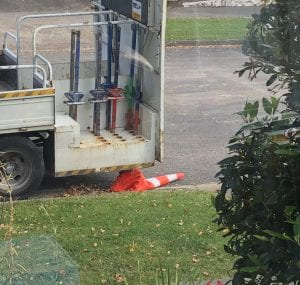Goodness gracious it’s just about the end of year two! As much as I may not like the way that it sounds when said out loud, this marks the halfway point of my degree. Having reached midway one might expect feelings of confidence, competence or even congruence in regard to one’s specialisation … I had hoped so too.

While the Bachelor of Engineering degree may be fifty percent complete, I am only just getting started with my specialisation (well, technically I have already done a third of that, but we are trying to forget about those big, scary numbers for the meantime). This is, I feel, an important distinction to make. I’ve already picked up a great deal of engineering knowledge, but now it is a case of actually applying it to the field of electrical and electronics engineering. If I had to place myself on the Dunning-Kruger curve it would be smack dab at the bottom. Not that it is a bad place to be, but the amount that I know I don’t know feels almost overwhelming.
Enough of this exposition chit-chat, let’s get down to business. “What business?” I hear you ask. Well today I thought I might try and convince you – yes you – to choose this delightful, exhilarating, and simply superlative specialisation. If you already know what specialisation you want to take, more power too you, then this blog may not be as helpful for you. Rather I hope to aid those who are still umm-ing and ahh-ing.
You really enjoyed ELECTENG 101
Well, it is a great place to start give that passing 101 is a pre-requisite for taking EEE, but 101 does give you a great overview of some of the places EEE can take you – content and career-wise. However, 101 is by no means that be all and end all of the EEE degree, I would argue that ENGSCI 111 and ENGGEN 140 are important and somewhat important respectively. You need not have adored 111, but the mathematics that it teaches will pop up now and then, so it is best that you feel confident with the content covered. Now 140 is not so integral, but it does expose you to the field of renewable energy generation, an EEE pathway that you could follow if you were so inclined.
The options are endless*
*Excuse the hyperbole, but the breadth of career option that EEE provides is astounding. I mean it is in the name: ‘Electrical and Electronics Engineering’, what other specialisation mentions two disciplines? (well, there is Chemical and Materials Engineering, but we can ignore them) From photolithography in the nanometres (or even angstroms soon) to speeds in the gigahertz, we end up covering several orders of magnitude of scale across the discipline. Your job opportunities span consulting, power electronics (including inductive power transfer i.e. wireless charging), power systems (generation and distribution), telecommunications, and potentially some of computer systems’ embedded devices. And remember, what you learn in your degree is only the beginning; there is so much more that you can, and will, learn – you have probably heard your lecturers talking about the idea that university is now about “learning how to learn”
At this point I realise that the next four reasons are not specific to EEE itself, rather they are just (in my opinion) good advice for choosing a specialisation.
- You should feel enthused. If you can’t get excited about it now, then you will find it harder to keep on going later. This is quite difficult to quantify, but think about which courses you spent the most time doing – was there a course that you would spend extra time doing to avoid other course’s work while still feeling productive?
- Almost all the specialisation’s content should look interesting, or at least not boring. You are going to be spending the next three years learning about it, so ensure that this time is spent exploring interesting subjects. Check out a specialisation’s Part IV courses to see what you might end up doing – often these courses are the most interesting/specific.
- The content should feel difficult but rewarding. No matter what specialisation you choose you are going to be learning some tricky content, so it helps if you find satisfaction when you get the right answer.
- Look at all of your options with an open mind. You may have come into the engineering degree dead-set on software your favourite specialisation, but do yourself the favour of looking around at what is available, even if it is just to eventually reaffirm your dislike of specialisation α, β, γ.
I hope that helps you make up your mind. If you are still a bit confused or indecisive then do look around at other blogs, or you could even post a comment if you have any queries. Before I say goodbye, I would just like to note the fact that all the engineering specialisations are just that – specialisations. You are all engineers; your specialisation is where you learn to apply your general engineering skills in a practical setting. Most engineering boils down to mathematics and systems design/analysis/modelling: now it is up to you to decide what type of systems you want to work with (I recommend electrical ones).
I hope this hasn’t been too polarising.
Further apologies are due to Icehouse for that cover image (primative man -> primative components hahaha…)
– Fraser
